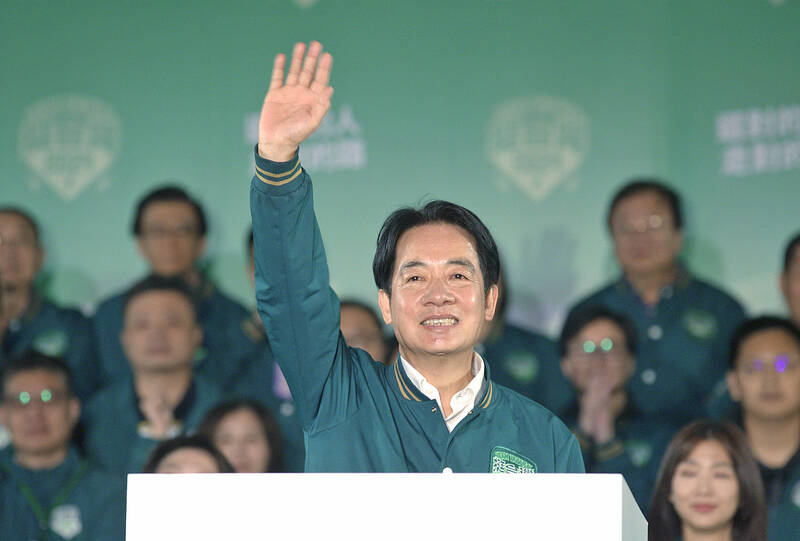President-elect William Lai’s (賴清德) inaugural address tomorrow would emphasize solidarity, steadfastness, confidence and responsibility as the themes of his administration, an incoming senior security official said yesterday.
Lai, who succeeds President Tsai Ing-wen (蔡英文) after having been her vice president for the past four years, would have to deal with a China that has ramped up pressure on Taiwan — with almost daily military incursions near its airspace.
His inaugural address would sum up his vision for defending the nation’s democracy, peace and prosperity, said the official, who asked to remain anonymous.

Photo: Chiang Ying-ying, AP
Lai would underscore continuity with Tsai’s policy of raising the nation’s profile in the international community by contributing to overcoming global challenges, the official said.
The speech would recognize that political partisanship is likely to become persistent and would compound the dangers posed by Beijing’s relentless campaign of coercion toward Taiwan’s national sovereignty, they said.
Lai would emphasize the importance of solidarity in countering Beijing’s efforts to sow division and strife, and that the government would uphold policies supported by national consensus and focus on improving Taiwan, they said.
The incoming administration’s policymaking, as encapsulated in Lai’s “National Project of Hope” policy blueprints, would be directed at realizing the principles of democracy, peace and public good, they said.
Steadfastness would underline the administration’s desire to continue with the foundations laid by Tsai, aimed at transforming the nation into an indispensable agent of stability in regional security and the global economy, they said.
Lai’s theme of confidence refers to staying the course on the policy of developing resilience and innovation, and realizing the Taiwanese values of hard work, kindness and generosity in dealing with the world, they said.
The president-elect would assure the nation of his willingness to be accountable to Taiwanese and direct the government to act as a responsible member of the international community, they said.
He would say that Taiwan must contribute to solving global challenges in solidarity with the world and conduct its affairs with dignity, they said.
Lai also faces major domestic challenges after his Democratic Progressive Party lost its legislative majority in January’s elections.
Asked to elaborate on Lai’s strategy to deal with division and partisanship in government, the source said the president-elect would be diligent in communicating with the public on matters of state.
The administration has faith in the principle that Taiwanese know that their destinies are bound together and that individual survival is found in common security, they said.
Additional reporting by Reuters

CHAOS: Iranians took to the streets playing celebratory music after reports of Khamenei’s death on Saturday, while mourners also gathered in Tehran yesterday Iranian Supreme Leader Ayatollah Ali Khamenei was killed in a major attack on Iran launched by Israel and the US, throwing the future of the Islamic republic into doubt and raising the risk of regional instability. Iranian state television and the state-run IRNA news agency announced the 86-year-old’s death early yesterday. US President Donald Trump said it gave Iranians their “greatest chance” to “take back” their country. The announcements came after a joint US and Israeli aerial bombardment that targeted Iranian military and governmental sites. Trump said the “heavy and pinpoint bombing” would continue through the week or as long

TRUST: The KMT said it respected the US’ timing and considerations, and hoped it would continue to honor its commitments to helping Taiwan bolster its defenses and deterrence US President Donald Trump is delaying a multibillion-dollar arms sale to Taiwan to ensure his visit to Beijing is successful, a New York Times report said. The weapons sales package has stalled in the US Department of State, the report said, citing US officials it did not identify. The White House has told agencies not to push forward ahead of Trump’s meeting with Chinese President Xi Jinping (習近平), it said. The two last month held a phone call to discuss trade and geopolitical flashpoints ahead of the summit. Xi raised the Taiwan issue and urged the US to handle arms sales to

BIG SPENDERS: Foreign investors bought the most Taiwan equities since 2005, signaling confidence that an AI boom would continue to benefit chipmakers Taiwan Semiconductor Manufacturing Co’s (TSMC, 台積電) market capitalization swelled to US$2 trillion for the first time following a 4.25 percent rally in its American depositary receipts (ADR) overnight, putting the world’s biggest contract chipmaker sixth on the list of the world’s biggest companies by market capitalization, just behind Amazon.com Inc. The site CompaniesMarketcap.com ranked TSMC ahead of Saudi Aramco and Meta Platforms Inc. The Taiwanese company’s ADRs on Tuesday surged to US$385.75 on the New York Stock Exchange, as strong demand for artificial intelligence (AI) applications led to chip supply constraints and boost revenue growth to record-breaking levels. Each TSMC ADR represents

Pro-democracy media tycoon Jimmy Lai’s (黎智英) fraud conviction and prison sentence were yesterday overturned by a Hong Kong court, in a surprise legal decision that comes soon after Lai was jailed for 20 years on a separate national security charge. Judges Jeremy Poon (潘兆初), Anthea Pang (彭寶琴) and Derek Pang (彭偉昌) said in the judgement that they allowed the appeal from Lai, and another defendant in the case, to proceed, as a lower court judge had “erred.” “The Court of Appeal gave them leave to appeal against their conviction, allowed their appeals, quashed the convictions and set aside the sentences,” the judges